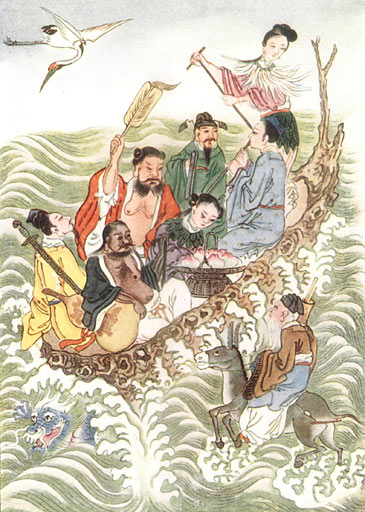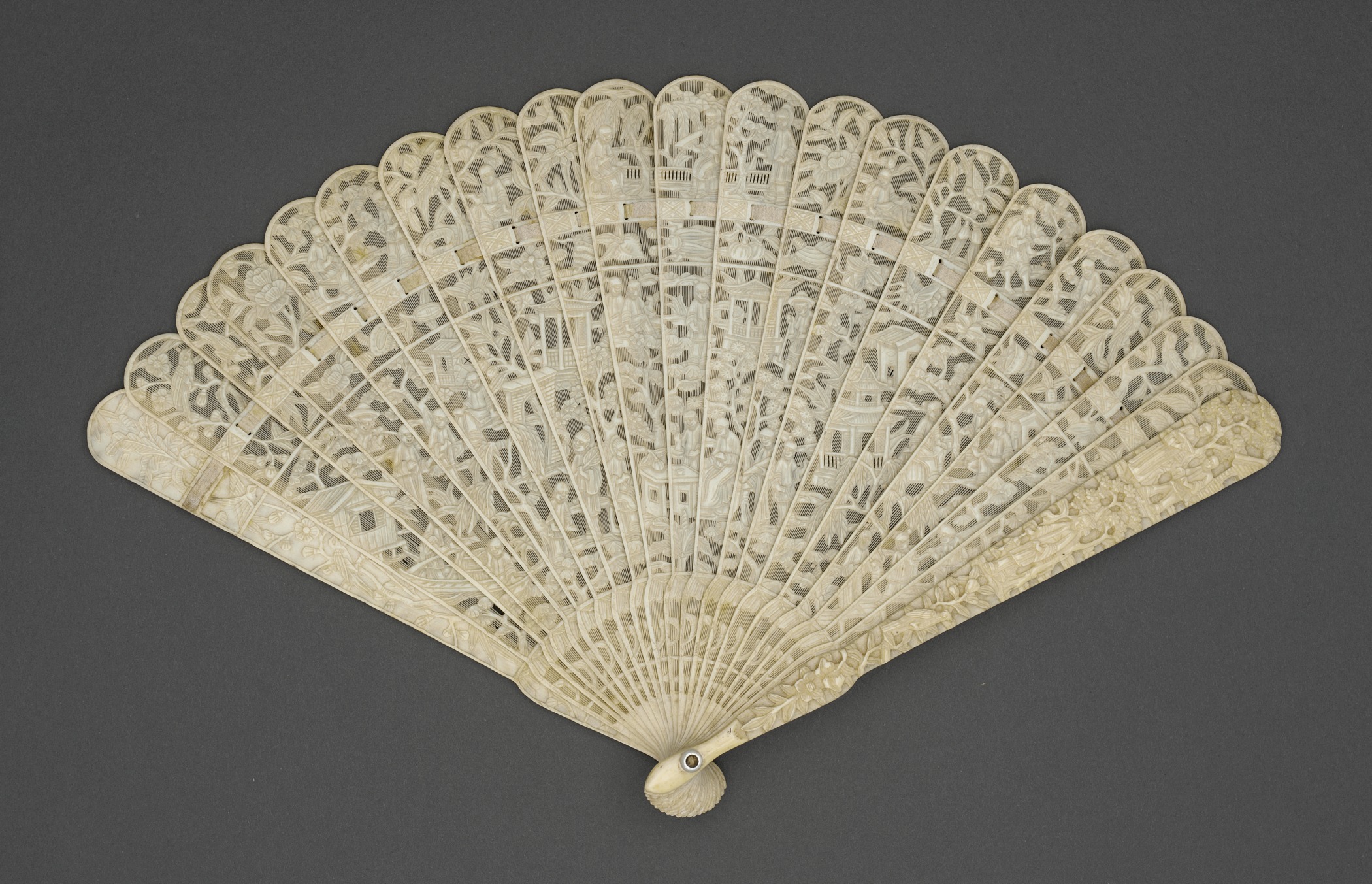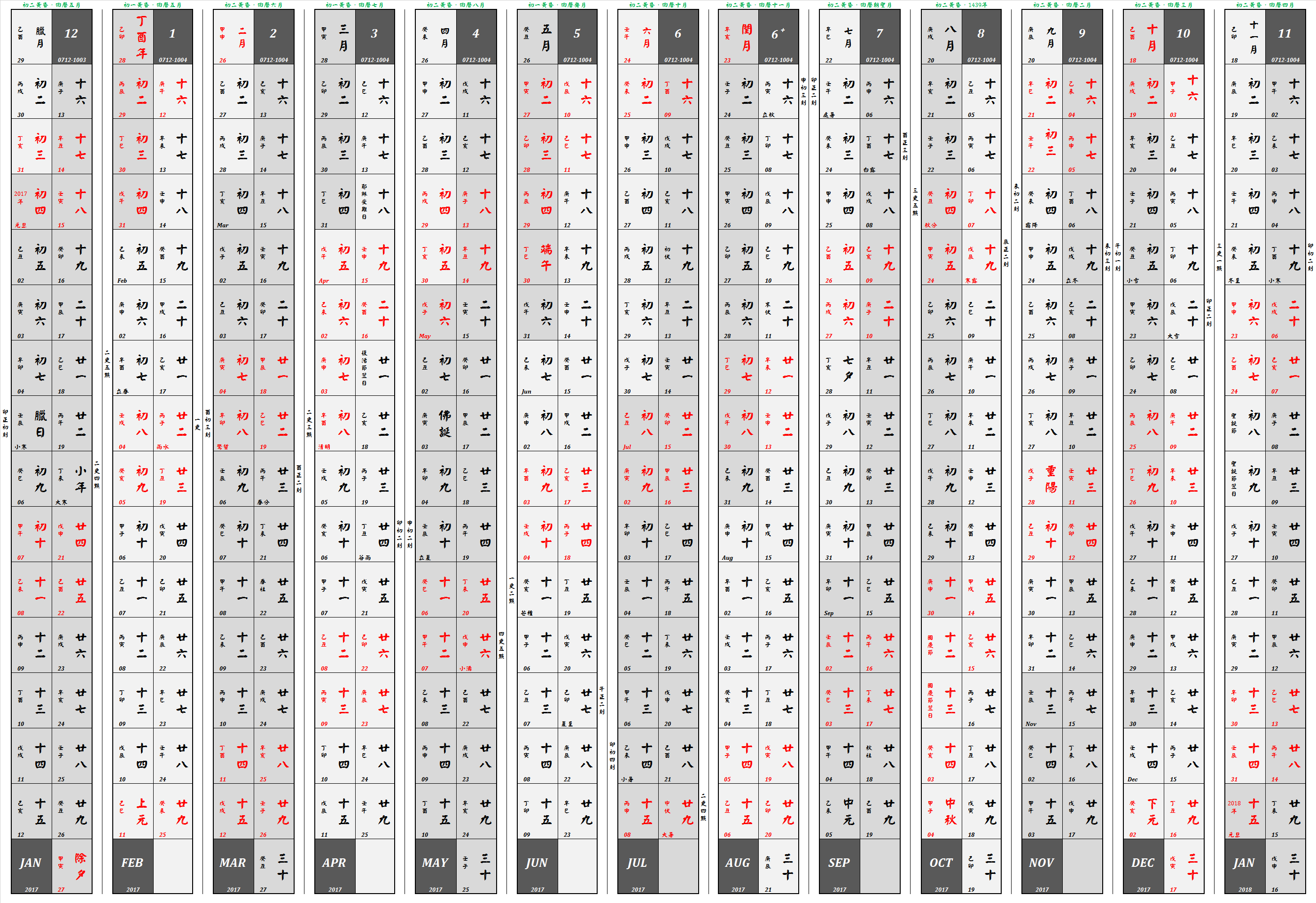|
Zhongli Quan
Zhongli Quan, courtesy name Jidao, is a Chinese mythological figure and one of the Eight Immortals in the Taoist pantheon. He is also known as Han Zhongli because he was said to have been born in the Han dynasty. In legend, he wields a large fan which can resurrect the dead and transform stones into silver or gold. Life Zhongli was born in Yanjing. According to legend, bright beams of light filled the labour room during his birth. After he was born, he did not stop crying until seven full days had passed. He was destined for greatness from the day he was born by showing features such as a broad forehead, thick ears, long eyebrows, deep eyes, red nose, square mouth, high cheeks, and scarlet lips. Stories depict that either seven days or seven years later, he began to speak, and the first sentence he uttered was, "my feet have wandered in the purple palace of the mmortals my name is recorded in the capital of the jade emperor." Later Taoists celebrate his birthday on the fifte ... [...More Info...] [...Related Items...] OR: [Wikipedia] [Google] [Baidu] |
Zhang Lu (painter)
Zhang Lu (; 1464–1538)Cihai: Page 1085. was a Chinese landscape painter during the Ming Dynasty (1368–1644). Zhang was born in Xiangfu (祥符; present-day Kaifeng, Henan) into a wealthy family and educated with princes of the imperial family. He attained great success as a professional painter but lived very simply, almost as a hermit. He began his study of painting by emulating the leading court painter, Wang E, but quickly turned from the academy to other models and masters. His courtesy name was Tianchi (天馳) and his pseudonym was Pingshan (平山). He was a student of Wu Wei.Cihai: Page 1085. Zhang followed the Zhe school of painting. He painted landscapes and human figures in a free and uninhibited style. Notes References * ''Cihai The ''Cihai'' is a large-scale dictionary and encyclopedia of Standard Mandarin Chinese. The Zhonghua Book Company published the first ''Cihai'' edition in 1938, and the Shanghai Lexicographical Publishing House revised editio ... [...More Info...] [...Related Items...] OR: [Wikipedia] [Google] [Baidu] |
Courtesy Name
A courtesy name (), also known as a style name, is a name bestowed upon one at adulthood in addition to one's given name. This practice is a tradition in the East Asian cultural sphere, including China, Japan, Korea, and Vietnam.Ulrich TheobaldNames of Persons and Titles of Rulers/ref> A courtesy name is not to be confused with an art name, another frequently mentioned term for an alternative name in East Asia, which is closer to the concept of a pen name or a pseudonym. Usage A courtesy name is a name traditionally given to Chinese men at the age of 20 ''sui'', marking their coming of age. It was sometimes given to women, usually upon marriage. The practice is no longer common in modern Chinese society. According to the ''Book of Rites'', after a man reached adulthood, it was disrespectful for others of the same generation to address him by his given name. Thus, the given name was reserved for oneself and one's elders, whereas the courtesy name would be used by adults of t ... [...More Info...] [...Related Items...] OR: [Wikipedia] [Google] [Baidu] |
Chinese Mythology
Chinese mythology () is mythology that has been passed down in oral form or recorded in literature in the geographic area now known as Greater China. Chinese mythology includes many varied myths from regional and cultural traditions. Much of the mythology involves exciting stories full of fantastic people and beings, the use of magical powers, often taking place in an exotic mythological place or time. Like many mythologies, Chinese mythology has in the past been believed to be, at least in part, a factual recording of history. Along with Chinese folklore, Chinese mythology forms an important part of Chinese folk religion. Many stories regarding characters and events of the distant past have a double tradition: ones which present a more historicized or euhemerized version and ones which present a more mythological version. Many myths involve the creation and cosmology of the universe and its deities and inhabitants. Some mythology involves creation myths, the origin of things, ... [...More Info...] [...Related Items...] OR: [Wikipedia] [Google] [Baidu] |
Eight Immortals
The Eight Immortals () are a group of legendary ''xian'' ("immortals") in Chinese mythology. Each immortal's power can be transferred to a vessel () that can bestow life or destroy evil. Together, these eight vessels are called the "Covert Eight Immortals" (). Most of them are said to have been born in the Tang or Song Dynasty. They are revered by the Taoists and are also a popular element in secular Chinese culture. They are said to live on a group of five islands in the Bohai Sea, which includes Mount Penglai. The Immortals are: * He Xiangu (), in modern context generally seen as the only female of the group, often depicted holding a lotus flower. * Cao Guojiu (), related to a Song dynasty emperor before he became an immortal. * Li Tieguai (), considered to be mentally disturbed and associated with medicine and easing the suffering of the sick and needy, identified by his iron crutch and Calabash bottle. * Lan Caihe (), originally pictured as female later developed an ambiguous ... [...More Info...] [...Related Items...] OR: [Wikipedia] [Google] [Baidu] |
Taoism
Taoism (, ) or Daoism () refers to either a school of Philosophy, philosophical thought (道家; ''daojia'') or to a religion (道教; ''daojiao''), both of which share ideas and concepts of China, Chinese origin and emphasize living in harmony with the ''Tao'' (, 'Thoroughfare'); the ''Tao'' is generally defined as the source of everything and the ultimate principle underlying reality. The ''Tao Te Ching'', a book containing teachings attributed to Laozi (), together with the later Zhuangzi (book), writings of Zhuangzi, are both widely considered the keystone works of Taoism. Taoism teaches about the various disciplines for achieving perfection through self-cultivation. This can be done through the use of Taoist techniques and by becoming one with the unplanned rhythms of the all, called "the way" or "Tao". Taoist ethics vary depending on the particular school, but in general tend to emphasize ''wu wei'' (action without intention), naturalness, simplicity, spontaneity and the ... [...More Info...] [...Related Items...] OR: [Wikipedia] [Google] [Baidu] |
Han Dynasty
The Han dynasty (, ; ) was an imperial dynasty of China (202 BC – 9 AD, 25–220 AD), established by Liu Bang (Emperor Gao) and ruled by the House of Liu. The dynasty was preceded by the short-lived Qin dynasty (221–207 BC) and a warring interregnum known as the ChuHan contention (206–202 BC), and it was succeeded by the Three Kingdoms period (220–280 AD). The dynasty was briefly interrupted by the Xin dynasty (9–23 AD) established by usurping regent Wang Mang, and is thus separated into two periods—the Western Han (202 BC – 9 AD) and the Eastern Han (25–220 AD). Spanning over four centuries, the Han dynasty is considered a golden age in Chinese history, and it has influenced the identity of the Chinese civilization ever since. Modern China's majority ethnic group refers to themselves as the "Han people", the Sinitic language is known as "Han language", and the written Chinese is referred to as "Han characters". The emperor was at the pinnacle of ... [...More Info...] [...Related Items...] OR: [Wikipedia] [Google] [Baidu] |
Fan (implement)
A handheld fan, or simply hand fan, is any broad, flat surface that is waved back-and-forth to create an airflow. Generally, purpose-made handheld fans are folding fans, which are shaped like a sector of a circle and made of a thin material (such as paper or feathers) mounted on slats which revolve around a pivot so that it can be closed when not in use. Hand fans were used before mechanical fans were invented. On human skin, the airflow from handfans increases evaporation which has a cooling effect due to the latent heat of evaporation of water. It also increases heat convection by displacing the warmer air produced by body heat that surrounds the skin, which has an additional cooling effect, provided that the ambient air temperature is lower than the skin temperature – which is typically about . Fans are convenient to carry around, especially folding fans. Next to the folding fan, the rigid hand screen fan was also a highly decorative and desired object among the higher cla ... [...More Info...] [...Related Items...] OR: [Wikipedia] [Google] [Baidu] |
Zhongli Quan Seeking The Dao ''
{{disambiguation ...
Locations *Zhongli District (), Taoyuan, Taiwan *Zhongli Township (), Gangbei District, Guigang, Guangxi, China People *Zhongli Quan () *Zhongli Mo () Other uses *Zhongli (state) (), ancient state in China *"Growing Pears" (), a short story from Pu Songling's ''Strange Tales from a Chinese Studio'' * Zhongli (), a playable character in ''Genshin Impact ''Genshin Impact'' is an action role-playing game developed and published by miHoYo. It was released for Android (operating system), Android, iOS, PlayStation 4, and Windows in 2020, on PlayStation 5 in 2021, and is set for release on Nintendo ... [...More Info...] [...Related Items...] OR: [Wikipedia] [Google] [Baidu] |
Yanjing
Ji or Jicheng was an ancient city in northern China, which has become the longest continuously inhabited section of modern Beijing. Historical mention of Ji dates to the founding of the Zhou dynasty in about 1045BC. Archaeological finds in southwestern Beijing where Ji was believed to be located date to the Spring and Autumn period (771–476BC). The city of Ji served as the capital of the ancient states of Ji (state), Ji and Yan (state), Yan until the unification of China by the Qin dynasty in 221BC. Thereafter, the city was a prefectural capital for Youzhou through the Han dynasty, Three Kingdoms, Western Jin dynasty, Sixteen Kingdoms, Northern Dynasties, and Sui dynasty. With the creation of a Jizhou during the Tang dynasty in what is now Tianjin Municipality, the city of Ji took on the name Youzhou. Youzhou was one of the Sixteen Prefectures ceded to the Khitan people, Khitans during the Five Dynasties. The city then became the Nanjing (Liao dynasty), southern capital of ... [...More Info...] [...Related Items...] OR: [Wikipedia] [Google] [Baidu] |
Chinese Calendar
The traditional Chinese calendar (also known as the Agricultural Calendar ��曆; 农历; ''Nónglì''; 'farming calendar' Former Calendar ��曆; 旧历; ''Jiùlì'' Traditional Calendar ��曆; 老历; ''Lǎolì'', is a lunisolar calendar which identifies years, months, and days according to astronomical phenomena. In China, it is defined by the Chinese national standard GB/T 33661–2017, "Calculation and Promulgation of the Chinese Calendar", issued by the Standardization Administration of China on May 12, 2017. Although modern-day China uses the Gregorian calendar, the traditional Chinese calendar governs holidays, such as the Chinese New Year and Lantern Festival, in both China and overseas Chinese communities. It also provides the traditional Chinese nomenclature of dates within a year which people use to select auspicious days for weddings, funerals, moving or starting a business. The evening state-run news program ''Xinwen Lianbo'' in the P.R.C. continues to anno ... [...More Info...] [...Related Items...] OR: [Wikipedia] [Google] [Baidu] |
Yin And Yang
Yin and yang ( and ) is a Chinese philosophy, Chinese philosophical concept that describes opposite but interconnected forces. In Chinese cosmology, the universe creates itself out of a primary chaos of material energy, organized into the cycles of yin and yang and formed into objects and lives. Yin is the receptive and yang the active principle, seen in all forms of change and difference such as the annual cycle (winter and summer), the landscape (north-facing shade and south-facing brightness), sexual coupling (female and male), the formation of both men and women as characters and sociopolitical history (disorder and order). Taiji (philosophy), Taiji or Tai chi () is a Chinese cosmological term for the "Supreme Ultimate" state of undifferentiated absolute and infinite potential, the oneness before duality, from which yin and yang originate. It can be compared with the old ''Wuji (philosophy), wuji'' (, "without pole"). In the cosmology pertaining to yin and yang, the mate ... [...More Info...] [...Related Items...] OR: [Wikipedia] [Google] [Baidu] |








